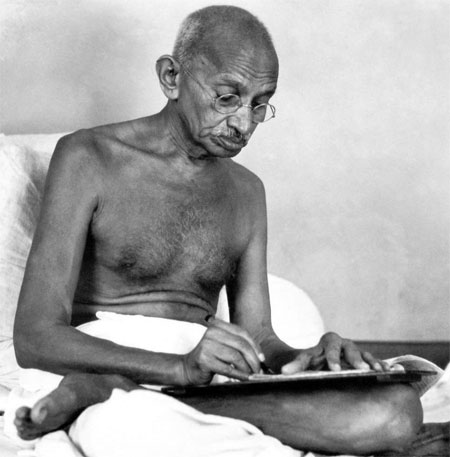“Poverty is the worst form of violence.”
“Violence is the weapon of the weak, non-violence that of the strong.”
“A good person will resist an evil system with his whole soul. Disobedience of the laws of an evil state is therefore a duty”.
[Quotes made during the life of Mahatma Gandhi.]
Looking at the behaviour our planet on just today alone, it is difficult to contemplate that, yes, today Monday, October 2nd, is the International Day of Non-violence, in honour of the birthday of Mahatma Gandhi.

Gandhi in 1942 – (Picture Dinodia Photos/Getty Images)
The once leader of the Indian independence movement against British rule, Gandhi was born Mohandas Karamchand Gandhi on October 2nd, 1869 and was assassinated on January 30th 1948, in his 79th year, by a Hindu nationalist, one Nathuram Godse, latter who had links with the extremist right-wing Hindu Mahasabha political party. Gandhi, alas, died when his assassin fired three bullets from a 9mm Beretta pistol into his chest at point-blank range.
The birthday of Mahatma Gandhi, on today Oct. 2nd 2017, is commemorated as Gandhi Jayanti, (meaning Gandhi Jubilee or festival) an official national holiday celebrated in India, usually by prayer meetings, commemorative ceremonies in different cities, in colleges, local government institutions and socio-political institutions. Painting and essay competitions are conducted as projects in schools and communities, encouraging discussion on a non-violent way of life.
On June 7, 1893, while travelling from Durban to Pretoria, Gandhi was asked to leave the first-class compartment on a train and move to the van compartment, despite having purchased a first-class ticket. When he refused, he was physically thrown from the carriage. This incident transformed Gandhi from the extremely shy, struggling barrister into a political activist, who would from that time go on to oppose all racial discrimination.
Likewise, while working in South Africa, Gandhi again faced discrimination, because of the colour of his skin. He was not allowed to sit with European passengers in a stagecoach and was told he had to sit on the floor next to the driver. He was then beaten when he refused. Indians during that time were not allowed to walk on public footpaths in South Africa, which led to him being kicked into a gutter by a police officer, for daring to walk near a house.
In yet another occasion, he was thrown off a train at Pietermaritzburg, having refusing to leave the first-class compartment. Here in protest he remained sitting in the train station, shivering all night, seriously considering whether he should return to India, or protest in support of his human rights. Thankfully he chose the latter and was allowed to board the train next day.
Known with the great respect as the “Father of the Nation” in India, Gandhi went on to play a pioneering role in India’s struggle for independence, emerging as a global icon of non-violent protest.
In the words of Dr Martin Luther King; “Gandhi was inevitable. If humanity is to progress, he is inescapable. We may ignore him at our own risk.”
Surely today these prophetic words, by Dr King, regarding Gandhi, must reverberate across the world, in light of today and other more recent happenings.

Leave a Reply